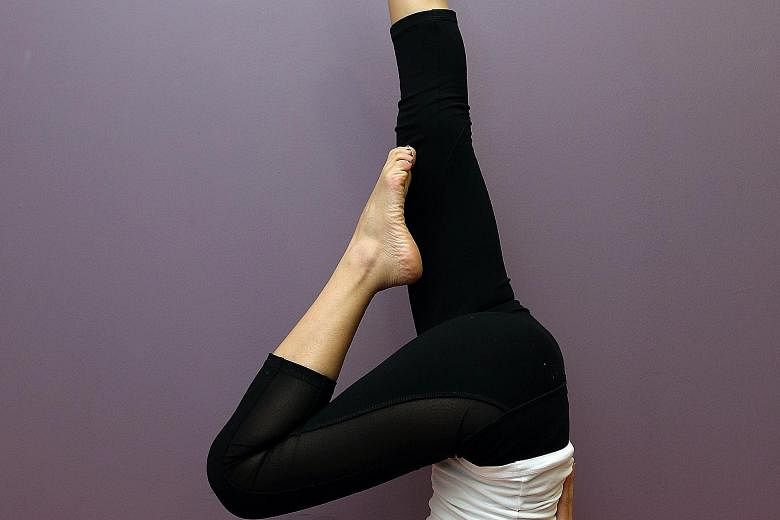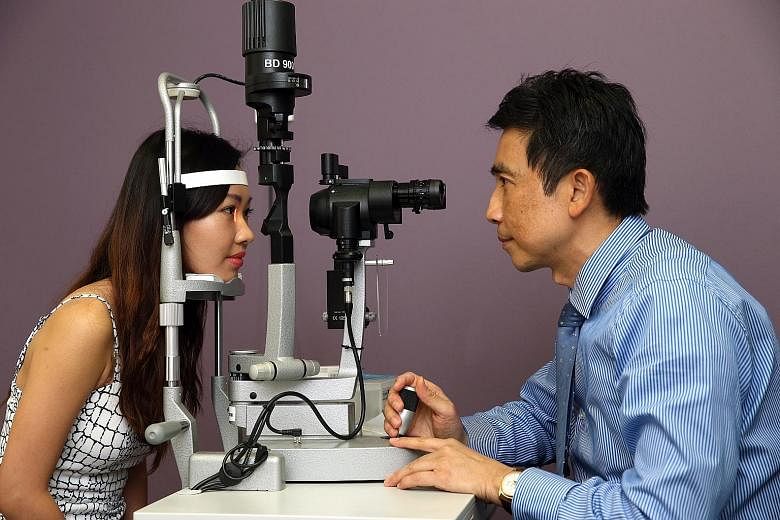More young adults are opting for Lasik surgery to lead active lifestyles, rather than for vanity reasons. A recent survey by global healthcare company Abbott in Singapore revealed the emerging trend among millennials, as six in 10 seek to correct their eyesight for lifestyle reasons.
People aged 21 to 35 areadopting active lifestyles and do not want to be held back by poor vision while they run marathons, cycle, sail, climb mountains, trek or ski.
Take Ms Celestine Lau, 28, a yoga instructor who underwent Lasik surgery early last year.
Her short-sightedness made it hard for her to practise and teach yoga for several hours every week.
She has short-sightedness of about -7.00 to -8.00 dioptres, more commonly referred to as 700 to 800 degrees. "The lenses on the spectacles I wore were quite heavy. The spectacles would often slip down or off my face while I was doing yoga," she said. Contact lenses were not ideal for her as they gave her dry eyes, Ms Lau added.
She recalled: "I also had to spend time cleaning and looking after the lenses. If there was a small tear that I did not notice and I put the lens in my eye, it would cause a lot of pain."
With spectacles or contact lenses, she was always squinting. She said: "At the end of the day, I would often have a headache because I had been straining my eyes."
The survey results also bear out what doctors have noticed.
Dr Lee Hung Ming, who has been performing Lasik surgery for more than 15 years, said that in the earlier years, his largest group of patients were between 30 and 45.
They were economically independent and could pay for the procedure, which cost a few thousand dollars per eye, said the medical director of Lee Hung Ming Eye Centre at Gleneagles Hospital.
But, with falling prices and the importance that millennials place on their lifestyle choices, rising numbers of younger people are undergoing Lasik surgery now, compared to 10 to 15 years ago, said Dr Lee.
He is seeing more patients opting for the procedure so that they can enjoy sporting lifestyles, he said.
At the Singapore National Eye Centre, Assistant Professor Mohamad Rosman has also noticed a similar trend.
The senior consultant ophthalmologist, and head of the refractive surgery service and Laser Vision Centre, said: "These patients want to perform activities such as swimming, sailing, rock climbing, skiing and travelling without the burden of spectacles or contact lenses."
Some of his patients also undergo Lasik surgery because of their careers. They include aspiring pilots, flight stewardesses, uniformed personnel and professional athletes.
SEEKING ACTIVE LIFESTYLES
The month-long survey by Abbott last July attracted more than 500 respondents aged 21 to 35 - both men and women. All have one vision issue or another.
The survey also gave a glimpse into the kind of active and sporting lifestyles millennials aspired to the most, without the hassle of wearing spectacles or contact lenses.
•86 per cent wanted to pursue water sports such as swimming, surfing and sailing;
•80 per cent wanted to go hiking, cycling or jogging;
•79 per cent wanted to travel;
•78 per cent wanted the thrill of adventurous activities such as bungee jumping or rock climbing; and
•75 per cent wanted to play ball, including football and basketball.
Six in 10 cited convenience as the most important reason for opting for Lasik surgery.
In contrast, only about two in 10 cited appearance-related reasons .
Even this minority gave practical reasons for choosing Lasik, such as the convenience of being able to wear non-prescriptive sunglasses and not having to struggle when applying make-up every day.
The survey also cast light on the rising myopia problem here.
Singapore has one of the highest rates of myopia or short-sightedness in the world, with eight in 10 diagnosed with it before the age of 18.
When the respondents were asked what they thought contributed to their imperfect vision and eye strain, 93 per cent pointed to the long hours of work or study.
Even more - 95 per cent - singled out the lack of rest for their eyes and 96 per cent blamed the higher usage of electronic gadgets among the younger generation.
Those surveyed said they spent at least 44 hours every week watching TV, being glued to their mobile devices and surfing the Internet for work and personal use.
Patients must be at least 18 years old to undergo Lasik surgery. Dr Lee said a person's myopia must also have been stable for over a year. When a person is under 18, not only is the body still growing, the eyeballs are growing too, which increases the degree of myopia, he added.
Meanwhile, having Lasik surgery has made a big difference in Ms Lau's life. She no longer has dry eyes or headaches from squinting. Best of all, she has more time.
"I wake up and I can see clearly," she said. "No more fiddling with contact lenses or looking for my spectacles. Spectacles also no longer fall off my face when I do or teach yoga."



